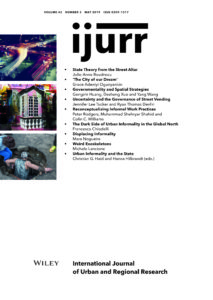A new policy approach that seeks to formalize street vendors by immobilizing them in designated places has been taken as an alternative to exclusion in Guangzhou, China. This article develops an analytical framework for understanding this spatial formalization by drawing upon Foucault’s concept of governmentality. Formalization can be understood as a form of spatial governmentality that seeks to guide the behaviour of informal economic individuals towards officially desired norms by creating bounded spaces. While the formalization programme reflects a moral form of political rationality that directs modern governments towards principles of social justice, it is fundamentally founded on a dispositional spatial rationality that imagines the dependence of social control on the ordering of space. However, this spatial rationality entails a tension between the goal of formalization and its practical effects, resulting in a failure to respect vital attributes of street vending and vendors’ counter‐responses to it. The article concludes by questioning the government’s formalization approach, given its ignorance of the reality of informality, and opens up the question of what might be good formalization.
Details
Written by:
Gengzhi Huang, Desheng Xue & Yang Wang
Digital Object Identifier (DOI)
10.1111/1468-2427.12730
About DOI

